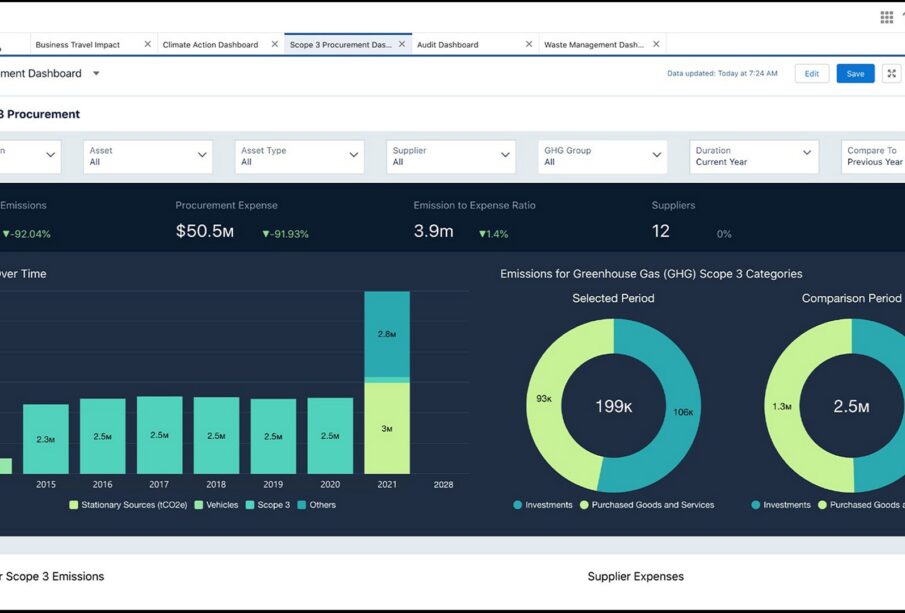
Salesforce officially announced sustainability as a core company value, joining its values of trust, customer success, innovation, and equality. And, to help organizations accelerate their own journeys to net zero emissions, Salesforce is also making Net Zero Cloud 2.0 — a solution that tracks greenhouse gas emissions — available globally.
“I’m extremely proud that we will now officially count sustainability as a core value, making it part of everyone’s job at Salesforce,” said Suzanne DiBianca, Chief Impact Officer & EVP of Corporate Relations, Salesforce. “When we add a value we operationalize it in every area of the business. In this climate emergency, we need every organization to get to net zero as fast as possible. Now that Salesforce has reached net zero emissions, we want to use our technology and best practices to help organizations reach their climate goals, too.”
Salesforce further integrates sustainability throughout company
At Salesforce, values drive the company’s decision-making. Every employee and team knows Salesforce’s values and strives to live by them every day.
With sustainability as a core value, Salesforce is leveraging its full power to drive climate action and further operationalize sustainability across its entire business. This means every internal organization incorporating sustainability into its V2MOM — a Salesforce alignment process that drives the company’s success.
Salesforce today has net zero emissions and has been voluntarily reporting on its greenhouse gas emissions since fiscal year 2012. Since that time, the company has continued to increase the scope of its climate action strategy by actively engaging policymakers, peers, partners, suppliers, and customers to accelerate towards a collective net zero goal. And just last week, Salesforce announced that it is tying executive pay to environmental, social, and governance (ESG) performance, including two sustainability metrics.
Mandatory climate reporting is coming
Regulatory change may soon require organizations to report on ESG matters, and many countries are already disclosing their climate-related financial risks and opportunities.
Legislatures and regulatory agencies in the United States are also considering disclosure rules. A bill that would require companies to disclose all greenhouse gas emissions is moving through the California legislature; and the U.S. SEC has solicited public input on voluntary climate change disclosures.
The next generation of Net Zero Cloud
In this new era of climate accountability, organizations’ carbon data will need to be as trusted as their financial data. Organizations will also need to know how to reduce emissions in a credible and meaningful way.
Net Zero Cloud 2.0 has been completely rebuilt to offer trusted reporting, deeper insights, and supplier management so that organizations can go net zero now. With Net Zero Cloud 2.0, organizations can get sustainability insights with powerful Tableau CRM dashboards to achieve their climate goals and take action with:
- Carbon Footprint Forecast: Organizations can find the fastest path to net zero with ‘what-if’ analysis to visualize progress and alignment to their climate action commitments.
- Science-Based Targets: Setting goals in line with science-based targets and measuring progress.
- Supplier Management: Track scope 3 emissions across the entire value chain and help suppliers and distributors reduce emissions.
- Waste Data Management: Organizations can upload and track hazardous and non-hazardous waste management data and treatment methods like landfilled, composted, or combusted — all in one place.
Customers and partners are implementing Net Zero Cloud
Global companies across industries are already using Net Zero Cloud to reach their climate goals:
- Mastercard (Global): Mastercard, a global technology company in the payments industry, is using Net Zero Cloud, with support from Accenture, to gain comprehensive insights around the emissions of its suppliers, enabling it to work more effectively with its partner network to take climate action.
- ISDI (France): ISDI, the world’s first digital business school, is using Net Zero Cloud to calculate the carbon footprint of each visitor to its Paris center based on the types of transportation used, length of hotel stay, and energy use onsite – made possible by strategic support from Accenture.
- Deloitte Germany (Germany): As one of the top companies for corporate travel, Deloitte Germany’s clients have been challenging them on the transparency of their carbon footprint and in some cases it is a deciding factor for winning business. With Net Zero Cloud, Deloitte Germany can track its carbon emissions on a project by project basis allowing clients and employees to have insight into the carbon cost of business.
- Uhuru (Japan): As a top digital transformation consulting services company, Uhuru is using Net Zero Cloud to track scope 1, 2, and 3 emissions to educate its employees about decarbonization and eventually enable them to use this knowledge to help clients with their sustainability mission.
- MillerKnoll (USA): MillerKnoll, a global leader in designs and furnishings, is using Net Zero Cloud with support from Salesforce consulting partner Orion Global Solutions to see its supplier environmental impact in one singular view. Its annual emissions report used to take hundreds of hours across 20 spreadsheets. Now, MillerKnoll knows where they stand relative to their goal at any time.
Salesforce’s consulting partners including Accenture, KPMG, Orion Global Solutions, PwC, Slalom, and Traction on Demand are actively implementing Net Zero Cloud for customers across industries. In addition, these partners provide advisory services to drive the digital transformation required for customers to accelerate their journeys to becoming net zero companies.
















